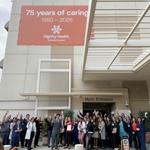The South San Francisco City Council stopped short of approving a 480-unit housing development last week, citing concerns related to wages paid to builders and plans to use gas-powered water heaters instead of electric alternatives.
The already lengthy approval process, started in 2018, will be pushed back at least until Dec. 8, at which time the item will again go before the council. Councilmembers expressed hope that the developer, Hanover Company, will concede to calls to employ union workers as well as incorporate the more environmentally friendly electric appliances.
“This project has been going on for three years and another two weeks won’t really hurt much,” Councilmember Buenaflor Nicolas said. “We have to give an opportunity to go and negotiate and collaborate more.”
The delay comes amid a contentious time for housing projects, with state laws passed in recent years aimed at pushing cities to approve more housing in response to sometimes clogged local pipelines for new developments and soaring rents. Developers have increasingly leaned on such laws to gain approval — sometimes through litigation.
The proposed developments would be comprised of two seven-story buildings slated for 100 Produce Ave. and 124 Airport Blvd. with a combined 743,700 square feet. The first two stories of the buildings would be parking garages providing 560 spaces.
The site is a half mile from the South San Francisco Caltrain station and 1 mile from a BART station.
Last week’s meeting marked the seventh public hearing pertaining to the development, however, it was the first time before the City Council. The Planning Commission previously requested numerous changes, ranging from design changes to the buildings’ facade, plant use in surrounding landscaping, to concerns for traffic management and calls for more affordable units.
The development is planned to contain 60 below-market rate units with 40 units affordable to people earning 80% of the area median income and 20 units affordable to people earning the area median income. Units suitable for a household of two in these categories would cost approximately $2,927 and $2,992 per month, respectively.
The affordability of the units falls short of the city’s requirements that 15% of units be set aside for people earning 50% and 80% of the area median income, but because the development was submitted prior to the enactment of the requirement it is exempt.
The development is also exempt from the city’s ban on natural gas in new residential buildings, a rule enacted earlier this year, for the same reason. The developer did note all other appliances will be electric, and the use of electric water heaters had not been entirely written off.
“We will collect estimates and bids for both projects and if they’re the same price we will go all electric,” Scott Youdall, a development partner at Hanover, said. “I’m not tilting against all electric, I’m tilting against uncertainty, and I’m tilting against cost that would cause this project to potentially teeter.”
Recommended for you
Youdall said he was concerned with adding cost to the project given that from the time the project was submitted there had been a decrease in the financial incentive to build housing on the site, which is currently commercial buildings that have seen their rents increase along with booming biotech and other industries in the area.
He noted further that Senate Bill 330, a state law that became effective last year that requires cities to not delay projects, does not apply because the project was submitted prior to the law. City Attorney Sky Woodruff noted the law would not apply due to the project requiring zoning changes. But, Youdall said, “that law was passed for a reason, and that is housing projects are taking too long to get approved and facing too many hurdles, and we have faced hurdles in this project.”
“Everything up until about three-four days ago felt like a collaboration and I’m concerned that what’s coming forward, if we can’t move forward now, will not be collaborative,” he said.
Councilmember James Coleman, however, said that despite multiple meetings with the developer urging the use of electric water heaters and union labor, as well as expressing concern of the amount below-market rate units, he had seen “very minimal” changes to the plan as a result.
“Climate change is real and action is required now, action was required yesterday,” Coleman said. “If this housing is going to be built it needs to be done in a way that is sustainable.”
Councilmember Eddie Flores said he too would like to see the building be all-electric, and said he was concerned that families in the community would be affected by the lack of union labor.
“We definitely want something positive for the community at all levels,” he said. “I would love to see a little bit more time so that there could be some negotiations moving forward. Let’s talk it out.”
Addiego noted the water heaters did not concern him as much as they did other councilmembers, adding that the new housing will likely prevent long commutes for people employed in South San Francisco — proving a net win for reducing greenhouse gas emissions.
“Sometimes there’s an effort to be perfect when it comes to something like natural gas, but we have to be a little bit reasonable in how it impacts us,” he said. “Architecturally and the design and what this brings is a project that I don’t want to see get away from us, but the Achilles heel is the labor situation.”
(650) 344-5200, ext. 105































(2) comments
Let's remind the SSF City Council of the "Penny-wise and pound-foolish" moniker. First trying to keep the rents low for certain income groups and then turning right around and insist on electric water heating. Don't they understand that this mandate will spike the sustained utility bill for these hapless tenants? It will offset any gains derived from keeping the rents affordable. That is not being 'green' but dumb.
Mr. van Ulden – don’t forget the SSF city council trying to shove union labor down the developer’s throat, too. Those additional costs will make these units even less affordable. Maybe the developer, Hanover Company, should back out of the development and read the fine print into recouping their sunk costs due to the city council changing the rules. What's next, requiring a certain quota for convicted criminals, people with red hair, people with one leg shorter than the other? I’m sure a profit can be made by selling the land and letting someone else go through the headache. Get out before more money is wasted on unnecessary delays.
Welcome to the discussion.
Log In
Keep the discussion civilized. Absolutely NO personal attacks or insults directed toward writers, nor others who make comments.
Keep it clean. Please avoid obscene, vulgar, lewd, racist or sexually-oriented language.
Don't threaten. Threats of harming another person will not be tolerated.
Be truthful. Don't knowingly lie about anyone or anything.
Be proactive. Use the 'Report' link on each comment to let us know of abusive posts.
PLEASE TURN OFF YOUR CAPS LOCK.
Anyone violating these rules will be issued a warning. After the warning, comment privileges can be revoked.